#the fact that there are still people who try to justify murder is frankly disturbing
Explore tagged Tumblr posts
Text
I'm sorry, but this is one of the most absurd arguments I've read as to why Tony is supposedly “justified” for his attempted murder of Bucky.
Simply put, NO, there is no justification whatsoever, neither moral nor legal about the attempted murder of a man who is perfectly well known to be a VICTIM and NOT the perpetrator of what he is accused of. And NO, Tony was NOT acting in self-defense when he tried to kill Bucky in cold blood, Tony was literally acting on the basis of revenge.
It couldn't be more irrelevant whether or not Tony knew that at the time of the Winter Soldier rampage, Bucky was being mind controlled, because that is something he without a shadow of a doubt knew afterwards.
After in 2014, Natasha leaked the SHIELD/ra information to the public, Tony and everyone (or at least those in positions of power) knew perfectly well Bucky's story, that he was kidnapped by HYDRA since 1945, that he had been tortured and experimented on until he was turned into their mindless tool.
Hence the reference to Manchurian Candidate, hence the reason why Tony offered Steve the opportunity to transfer Bucky to a psychiatric center and prevent him from being taken to a Wakandan prison (even though RDJ said in an interview that this was false because Tony didn't have the authority to do something like that).
There is no doubt that Tony knew full well that as the Winter Soldier, Bucky did NOT have the remotest control over his actions, and that he was as big a victim as his own parents. What Tony saw on the tape was not cold-blooded murder by a ruthless killer, it was an innocent man whose agency was taken from him and whose body was being used against his will, being used to cause harm.
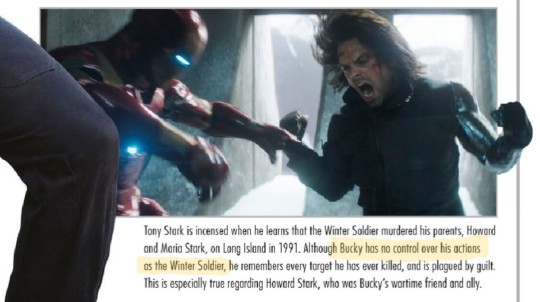
Tony's own friends and allies like Clint, Bruce, Erik Selvig, Hellen Cho, etc, have already been victims of mind control and he never held them accountable for what they were forced to do in state.
Tony himself knows what it feels like to have someone play with his mind. That's why it's horribly hypocritical and unjustifiable of him to have lashed out at someone he knows is just another VICTIM of his parents' real killers.
Tony himself personally experienced proof that Bucky was still a dangerous active weapon
Are you serious? NO. What Tony experienced was proofs of mind control taking away Bucky's identity, agency and autonomy.
“A dangerous active weapon” is a very convenient description to try to make Bucky look like an irredeemable monster being under mind control. ANY. OTHER. AVENGER. IS. A. DANGEROUS. WEAPON. UNDER. MIND. CONTROL. As was Clint, as was Bruce/Hulk, who literally attacked Tony, and who he never blamed for it.
And no, Tony did not attack Bucky “in self-defense.” Tony attacked him with the direct and undeniable intent to kill him in revenge. It is Bucky who only acted in self-defense, who was only trying to flee and avoid confrontation.
And worst of all, not only did Tony intend to kill a man he knows perfectly well is innocent, just to “avenge” his parents, Tony wanted to hurt Bucky to get revenge on Steve, the writers literally confirmed it.
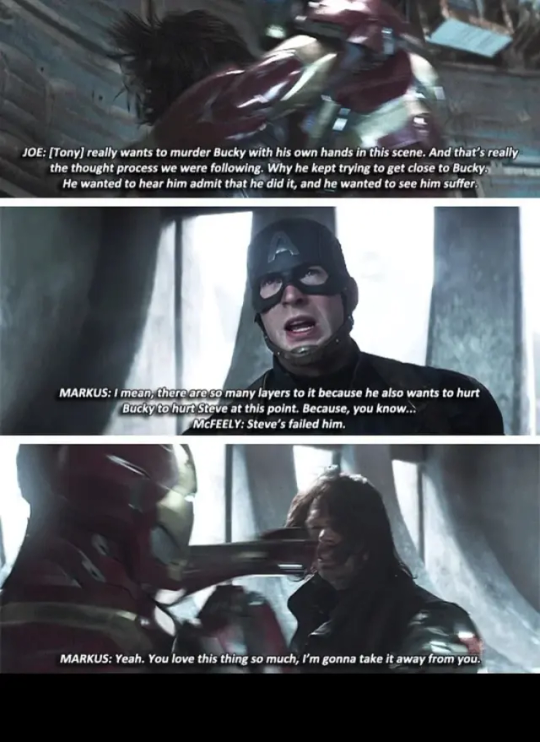
Tony was going to take the life of an innocent victim to get revenge on someone else.
Not only is there no moral or legal justification for this, but it is one of the lowest and most dishonorable acts anyone could do.
I always see Anti-Team Cap and Pro-Tony discuss how Tony attacking Bucky and Steve was justified and made sense, and yes, I totally agree with them, and regardless of the fact that Tony attacked Steve first because Steve was the one who lied and betrayed him, there is one thing that I haven’t seen be discussed much.
And it’s this scene right here:

Look at Tony’s face. Look at the shock and fear.
Bucky had no way of knowing that Tony could have protected himself, and he aimed right at Tony’s head. Look at the proximity of the weapon to Tony’s face. He could’ve blown his mind clear off if Tony wasn’t fast enough.
Tony had absolutely no way of knowing that Bucky “had changed” when literally just what? Days? Hours? Moments? ago, he could’ve died at Bucky’s hands.
That’s all I have to say.
#in case there was any doubt#there is no moral or legal excuse for attempted murder#that is literally illegal#and in a fair world Tony should have faced charges for that#tony committed a crime and has no excuse for it#the fact that there are still people who try to justify murder is frankly disturbing#Bucky is the real victim here#and Tony knows that#he just didn't care
976 notes
·
View notes
Text
<.< that Red John story arc needs a fix-it fic asap. I am aware it is 2022 and the Red John reveal happened back at the end of 2013 and that the show itself ended in 2015. I blame the fact i had just graduated college and was starting a new job. I'm catching up, forgive me, halfway through season 6 right now. Sure I'll finish by the end of the week. Anyways back to the fix-it fic want and need. I will caveat; the Red John reveal is great, love who they chose for it, makes perfect sense actually, also love that actor a lot, especially as a villian cause he has a colloquial manner that makes him appear trustworthy and fatherly but than the actor can really pull out the evil villian routine with a 1000 yard stare acting. The Red John showdown was also good but because of the flaws in the buildup to the reveal and showdown it isn't as great as it could have been.
Biggest issues are:
1. Red John knowing about the list: I don't mind the list. In fact I loved it. Just didn't like the whole RJ knowing about it bit. Also Haffner and Reed didn't need to be on it. The other 5 are perfect suspects. But RJ knowing that Patrick suspected specifically who he was kind of took the cat and mouse game thrill out of the equation. Like every time Jane or the team met with one of the suspects the implication is that RJ knew they knew. And that's no fun. I liked Jane having a one up on RJ without RJ's knowledge and frankly the gymnastics that a writer has to go through and still hasn't explained to justify how RJ knew about the list is unneeded. There was a lot more story ammo and plot to be had if RJ did not know about the list.
2. The Blake Organization: Ew. Not needed. Ruined the whole motivation behind RJ for me. I contend that RJ had a loose organization of corrupted individuals he patroned and encouraged/corrupted while also cherry picking certain people that made it to top key positions in gov't and law enforcement to curtail his and his proteges' from being arrested. This was actually hinted and alluded to throughout the beginning seasons and I loved that cause it ties into what I think RJ's motivations are.
Red John is evil. He doesn't want power or money. He wants to rape and murder and see fear in the eyes of his victims and slaughter lambs. And he wants to make more tygers to slaughter those lambs. That's the point of the whole Blake poem, not as some chintzy password for a self-promoting and self-aggrandizing heirarchal command structure. That's what the Visualize foil was for. The inclusion of the Blake organization takes away from what matters in my head. RJ's motivations.
3. Red John's Motivations at the end are wrong: (Personal Opinion) RJ is obsessed with Jane. Because RJ feels lonely. He's incredibly smart, hence his ability to manipulate and to elude capture. He longs for someone he can share that with. He's also evil and he wants people to accept his evil needs so he finds those like him and encourages it. He tricks people like Lorelei Martins into corrupting themselves. And, though he murdered Jane's wife and daughter as punishment for Jane's hubris and slights, I think when Jane joined CBI and after RJ had time to look into Jane's background, RJ began to view Jane as a challenge. Could he corrupt someone without tricking them? Could he convince someone to be like him? Could he make someone who hates him, love him? Someone like Jane who has darker tendencies and strengths but wasn't like RJ from the beginning. Could he draw Jane's evil out of him? Those are RJ's motivations for me. Not some silly power play secret society allusions of grandeur. Just a profoundly disturbed human trying to make the world burn with him.
Conclusion: <.< ....... I'm gonna write a goddamn fix it fic. The conclusion to Jane and Red John's story deserved better. Wasn't bad, again, wasn't bad. But it could have been great.
Also because of the strange convolution in the buildup to the reveal we lost sight of Jane's motivation. Though Simon Baker is a PHENOMENAL actor that managed to reassert that lost motivation right back in at the end. God his facial expressions and how he said their names. Good stuff. Good stuff. Like I said the showdown was great. Just could have been better.
So I'll make it better. We'll see if I finish this time.
28 notes
·
View notes
Text
Another thing about Jet and Zuko is that Jet had attacked innocent people based solely on them being Fire Nation before, and then lied to Katara, Aang, and Sokka about it, which shows that he knew his behavior was wrong, but made excuses for it because he wanted to keep doing it. It’s not just that Jet doesn’t care about hurting innocents, his behavior in the episode where he is introduced is extremely manipulative.
Jet: Sokka, you told them what happened, but you didn't mention that the guy was Fire Nation?
Katara: No, he conveniently left that part out.
Sokka: Fine! But even if he was Fire Nation, he was a harmless civilian!
Jet: He was an assassin, Sokka. He was sent to eliminate me; you helped save my life, Sokka.
Katara: I knew there was an explanation.
Sokka: I didn't see any knife!
Jet: That's because he was concealing it.
Katara: See, Sokka? I'm sure you just didn't notice the knife.
Sokka: There was no knife! I'm going back to the hut and packing my things. [Sokka stomps away.]
Jet: Tell me you guys aren't leaving yet. I really need your help.
Aang: What can we do?
Jet: The Fire Nation is planning on burning down our forest. If you both use waterbending to fill the reservoir, we could fight the fires. But if you leave now, they'll destroy the whole valley.
This is just a snippet but almost all of Jet’s dialogue is like this. When Sokka objects to attacking innocent civilians, Jet completely makes up a lie about how the old man he attacked was really an assassin. Jet knows that this lie will appeal to Katara and Aang’s sense of justice, and he also tries to appeal to Sokka’s desire to prove himself as a warrior by telling a story about how Sokka “saved” him. And this bothers me more than Jet’s violence because it’s a frankly dangerous reframing of events that I see a lot in supposedly progressive places. And it honestly disturbs me that so much online rhetoric in fandom spaces focuses on telling people they are wrong for spotting and objecting to manipulative behavior. Abusive people can and do use social justice rhetoric to justify bad actions. And when you call a person like that out on it, they do exactly what Jet does, because “but don’t you believe that [whatever cause this person is championing at the moment]” is hard to argue with.
Now, Jet may actually believe some of the things he says - I actually think he does, he seems to have bought into a belief in himself as a Robin Hood figure - but that doesn’t make his behavior any better. After the story about the knife, he guilts Katara and Aang into staying by insisting that he needs them for another important mission, which he again is lying about.
Jet’s narrative function in this episode is primarily to be a foil for Katara, someone who she sees as sharing her revolutionary spirit, a kindred soul and another kid like her who was forced to become an adult too quickly because of the loss of their parents and compensated by trying to care for a group of kids, but she ultimately rejects his violence, and he uses her and Aang even knowing that they would not agree to his plan if they knew the truth, which shows not only that he knows his behavior is wrong and is unconcerned with murdering an entire village, but he’s also not concerned with how he hurts Aang and Katara on a very personal level, and sees them as a means to his end. He tried the same thing with Sokka but Sokka said no. (And one reason why Sokka, along with Iroh, remains one of my favorite characters, is because neither of them have time for manipulators.)
Jet’s narrative function in season two is primarily to be a foil for Zuko, to show that true change and redemption and forgiveness are things that require work.
The fact that Jet is more complicated than just a villain we are supposed to hate or a cautionary tale on revolutionary violence is a mark of good writing, but it still does not mean that he was justified.
54 notes
·
View notes
Note
What do you feel about the post about Vic mignogna by ultraericthered
https://ultraericthered.tumblr.com/post/183990672385/im-sick-of-the-rangers-spamming-vics-tag-with
Let’s break this down.
Vic is absolutely guilty of inappropriate behavior, misconduct, sexual harassment, and possibly (just possibly) sexual assault towards others. This has been established by his pattern of behavior for years. Monica and the others are being entirely honest in their stories and the allegations are very likely honest as well. How this is even in question, I have no idea, but it upsets and disturbs me that there are so many who are quick to jump to Vic’s defense while simultaneously vilifying his opponents and accusers (and possibly victims).
A, He hasn’t been proven guilty of exual harassment OR assault and inapporiate behavior means nothing.
And B. yeah, no. Monica has been lying via omission for months now, refusing to give ANY details on any incidents DESPITE the fact that those details are REQUIRED to convict him. And before you say she’s scared: she’s openly threatened vic supporters with legal action. Over asking her for info. That is not the behavior of an innocent person.
Oh and C. NOTHING came to light about Vic for MONTHS. The ProJared shit started and ended in the same month.
What gives credibility to the side of Monica Rial, Jamie Marchi, Jamie McGonnigal, Marzgurl, etc. is that not only do their words and allegations line up with accounts of Vic’s skeevy behavior towards fans and women that have been going around the internet for YEARS (It’s honestly astonishing just how far back some of this goes), but how many other VAs, people actually in the industry who might’ve worked alongside Vic and would be there to witness his actions, have come out in Vic’s defense? Can’t really think of much. Meanwhile, how many have been coming out in support of the alleged victims? Quite a handful, even J. Michael Tatum, himself a victim of sexual assault in the past. Apparently, Vic being a primadona and a skeevy womanizing creeper has been an open secret in the VA industry since forever.
And of these guys:
Monica has evaded legal action and refused to give details NECESSARY to convict him
Marzgurl has sactively ENOCURAGE VIOLENCE
And Jamie has been proven to bully people into dropping Vic from cons.
As for the ‘accounts”: they’re eitehr anonyomous accounts, too old to prove...or taken out of context of the people involed.
And by the way. how many famous people probably came out and said ‘that guy’s a commie’ back during the Red Scare? People coming out to help doesn’t MEAN anything without proof. People in the wrong can still come out in droves. And if that doesn’t convince: does that mean rape victims who don’t have public support while their rapists DO are the ones in the wrong then? Same logic of ‘One party has more public support than the other, therefore they’re right.’
What’s damning on Vic’s side of things? Well not only was a thorough investigation into the sexual harassment allegations conducted during the time of the Broly movie’s production prior to Funimation’s decision to lay Vic off (something his fans don’t even seem to realize happened) -
You mean the one where they didn’t give any info and was probably a ‘cut off the controversial figure for profit’ decision?
- but Vic’s response to the whole situation has…just not been how I think an absolutely innocent man getting his career and livelihood threatened by accusation of things he absolutely never did and would never do would respond. Vic’s been pretty sincere and professional throughout this and I give him props for that, but his “defenses” against the allegations have always been along the lines of “I remember things differently” or “I didn’t realize she felt that way - I thought that thing we had was consensual and mutual.” Of course he’s not going to recall those incidents as being ones where he committed sex offenses because he did not see his actions as being such when he committed them. He fails to recognize how and why his behavior is so wrong. He doesn’t knowingly think of himself as a sex fiend and harasser when he acts that way - he really thinks he’s being nice (backed up by the allegation where he repeatedly asked his victim to “let me be sweet to you.”). But those moments were not consensual. The girls and women he touched or romanced were not comfortable with it.-
And Monica has threatened legal action and Marzgurl thretaened PHYSICAL VIOLENCE.
You wanna judge this based on public reaction? Show me where Vic threatens anyone who questions him.
What his intentions were at the time don’t matter when put next against how his victims internalized his actions and how they were made to feel -
No, intentions DO matter. That’s why ‘self defense’ and ‘murder’ are different concepts.
And on top of that, look at how Monica Rial worded her own account:
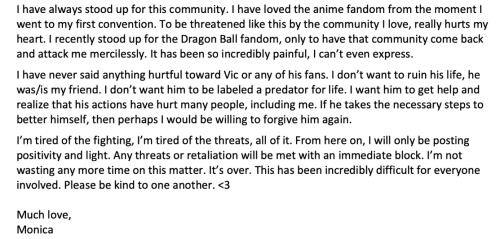
This, by contrast, is Vic’s wording of his side of things. He “got lazy.” He’s “a work in progress like everyone else.” And my personal favorite: “Voice actors are no different from you: we’re bozos. We’re all dumb humans just trying to do our best.” The emotions are sincere, but the words are unrefined and a bit try-hard in trying to paint a sympathetic image of himself.
And Monica, by your own standards, is trying to appeal to basic human empathy to trick people into believing her. Thing is, Vic is consistent in his actions. Monica has acted contradictory MANY times.
And what’s damning on the side of Vic’s fans and defenders? Well, I could not help but notice that they can be found all over Youtube, hive of the Far Right that it’s become-
Strike 1.
I also could not help but notice that whenever I clicked a video made for supporting Vic and tearing down his opposition and accusers (who, again, could very well be his victims), it was literally ALWAYS a dude speaking.
Strike 2.
It was always some man speaking in defense of this other man who he probably doesn’t even personally know in a situation he wasn’t there to experience and knows next to shit about, and demonizing “waamen” that he also doesn’t personally know. And in all of this, I have not once seen any valid reasoning for why Vic absolutely must be innocent of the allegations made against him other than “he’s a super popular, charming, beloved VA” and “he seems like such a nice guy”. It’s frankly quite terrifying that the immediate default for these people is to stand with the popular, prolific, powerful man (and I don’t want to be an SJW here, but that Vic is handsome, white, straight/cis, and Christian might be a huge part of it
Strike 3-
Not only is this gonna EMBOLDEN the assholes on Vic’s side-
But Monica’s defenders (like YOU) have focused on gender and bullshit instead of anything FACTUAL. You act like anyone whose accused of sexual assault is IMMEDIATELY guilty if the accuser is a woman and teh accused is a man. Never mind how most of these accusations come down to simple miscommunication between the parties and nevermind how if a guy tries coming to the police about being raped, it’s likely HE’LL be arrested. Let alone what happens if the woman gets pregnant and can sue for child support...even if she committed STATUTORY RAPE.
Oh, and Vic’s italian and that culture is very touchy feely. So guess what? You’re racist by your own logic.
and denounce the women who come forward to accuse him as being liars because this is exactly why women who are victimized by men of such power and popularity tend to NOT come forward with stories of their victimization immediately after it happens. Yes, anyone is innocent until proven guilty in a court of law, but that doesn’t mean the accusers should be denounced as liars and demonized for daring to mess with the man - they ought to be shown support and respect IF in the case what they say is true and they really were hurt by that man. If they’re proven liars beyond any doubt, THEN they can be given well deserved scorn. But brushing them off beforehand is Not OK. Especially if it’s with conspiracy theories about how this is some big coordinated feminist effort to tear down a great man and destroy his livelihood, or it’s a retaliation from yaoi fangirls who hate that Vic dares to be anti-yaoi and Conservative in regards to gay people.
And yet you condemn Vic before he is proven to be lying.
Sorry, either condemn yourself or be better.
These assclowns have also constantly resorted to the defense of “Oh, hugging other people and kissing them in places not on the lips totes isn’t sexual harassment”. Totally ignoring the little details of the girls getting the hugs typically being total strangers to Vic outside of being fans of his work who are thus underage girls being touched by a grown man who has absolutely no relation to them, that he might have done the same with female co-workers behind the scenes, and that he has done these things on a whim, without the recipient’s consent and without paying any mind to how it might make them feel.
Also ignoring if they give consent like that time someone tried portraying Vic touching a supposedly underage girl only to BACKFIRE as the womana spoke out in defense of the man.
This has been a consistent pattern of behavior with him,
Consistently unproven.
and allegedly, he’s justified it with saying “silence gives consent.” Like a girl or woman absolutely has to verbally say “no” or tell him outright that he’s making them feel uncomfortable for it to be considered wrong and unwarranted. Basically “a lack of a No makes it a Yes.” I can’t begin to describe how gross that is.
So Vic has to be a fucking MINDREADER or else.
Great to know, especially considering how my own condition would make this shit damn near impossible to see.
The worst part is how these IStandWithVic cultists demonize Monica Rial. A woman who, by her own admission, was a victim of rape as a teenager.
Says the man who demonizes Vic.
A woman who has shown nothing but emotional and intellectual honesty and kindness on social media, who has acknowledged that even Vic and his fans don’t deserve to be harassed and hurt, to the point of stating this:
https://twitter.com/Rialisms/status/1095156641543192576
Funny how she says this TWO DAYS LATER than your picture.
But she’s both painted as a vicious liar who’s out to destroy a good, innocent man’s life and career, and is ALWAYS being written off by these dudes as just “the VA for Bulma.” As though she’s had no other notable roles in her long career of voice acting aside from that one character (as opposed to the oh-so talented, versatile and legendary star that is Vic). As though that character has had only one English VA. As though Monica just plain doesn’t matter when put next to a fellow VA in the industry who happens to be a handsome white, straight/cis, Christian male.
Keep being a bigoted douchebag, I can hear the alt RIght cumming.
And as though Monica had any feasible reason to lie about her experiences with Vic and assassinate his character on social media.
*points at you and your blind defense of her*
the pro-Vic crowd seems to think she’s greedy or jealous or just resentful towards Vic as a person, and is out to get him so that she can get money or respect or more roles or petty revenge or whatever.
Literally change ‘vic’ to ‘monica and that’d describe you.
But if that were really the case, how does that account for the friends and family who support her claims? How does it account for the fellow VAs (Jamie Marchi, Jamie McGonnigal, J. Micahel Tatum, Josh Grelle, Justin Briner, Daman Mills) who’ve all supported her claims and have said “Yeah, Vic’s been like that forever.
‘Get social brownie points’
How does it account for the fans and congoers who have been sharing their stories of uncomfortable experiences and encounters they’ve had with Vic FOR YEARS?
‘Stories’ are not truth.
The deck is NOT stacked in Vic’s favor here, so “he’s successful, popular, funny, friendly, charming, talented and a classic VA who’s so well loved in the anime community” is NOT going to cut it as an assumption of his innocence or a defense for his character.
No, that’s the legal system that says ‘innocent until proven guilty.’
He needs to be held accountable for his misdemeanors against people who gave no consent to being touched, hugged, kissed, stalked, romanced, or squicked out by him.
And yet Monica threatening legal action and Marzgurl making THREATS OF VIOLENCE? A-Ok.
It’s a Michael Jackson type of situation - even if he’s NOT done the things he’s being accused of, that does NOT make his creepy behavior towards underage fangirls excusable or alright.
Funny thing about Micheal Jackson-
The accusations, when you actually pay attention, are complete bullshit. Events don’t line up, accounts vary wildly, facts contradict stories. And yet he STILL suffered until the day he died and BEYOND. So thanks for remindidng why, as much as I hate Yellow Flash, Hero Hei and Nick Riekta-
You idiots are the worse evil.
Tl;dr: I shall from now on be referring to this VA as “Vic Cosby Mignogna.” ‘Cause even if he’s not guilty of the heinous shit that Bill Cosby is guilty of, his case is still all too eerily similar.
#IStandWithMonica
So does that mean if I call Monica ‘Monikkka’- She’s a KKK member now?
Oh wait, you wouldn’t give two shits if the places were reversed would you? For your cry of ‘I’m not an SJW!’- You sure do sound like the fucking strawman it represents.
17 notes
·
View notes
Text
Daredevil in “Black Widow: Breakdown”

“Breakdown” is a three-issue story arc, the second part of Devin Grayson’s Black Widow run, co-written by Greg Rucka with gorgeous painted artwork by Scott Hampton. It is an exploration of morality, superheroism, and the idea of means justifying ends, tied up in a neat little spy thriller. I assume any Black Widow fans reading this are already familiar with “Breakdown”, and I’m not here to break down (…sorry) the full story; that has already been done by people much more familiar with the Black Widow canon than I am. What I’d like to do is talk about its most unexpected side-character: Daredevil.
In the first arc of her run, Grayson introduced Yelena Belova, a new and (to her own mind) improved Black Widow. Yelena is a recent graduate of the Red Room who feels so confident in her abilities that she tries to kill Natasha and claim her title. Yelena is young, driven, and naively idealistic, resulting in a black-and-white mindset that is dangerous for espionage work. Natasha observes this in their early interactions, and decides that she needs to help Yelena by teaching her the harsh truth of what it really means to be a spy. “Breakdown” follows her attempt to do this— by kidnapping Yelena, surgically swapping their appearances, dropping Yelena into her (Natasha’s) life, and seeing how she copes. It’s a highly personal, intimate story between the two of them as they literally embody each other, and as the lines between their identities begin to blur.
So why did Grayson and Rucka feel the need to bring Daredevil into this? Heck, why does Natasha? This is a top-secret SHIELD operation, and Matt is hardly a spy. It’s also clear from the beginning that this attack on Yelena is rife with moral issues. It is, frankly, shocking, and a big theme in this story is analyzing whether Natasha’s behavior is justified– and whether morality can afford to matter in the high-stakes, ethically murky world of international espionage. Yelena may be a dangerous enemy, but she is also a human being who is kidnapped, disfigured, and psychologically tortured over the course of the story. Natasha is confident in her actions, but she is also aware of how they would look to an outside observer, and from the beginning, she expresses discomfort in revealing the details of her plan to Matt.
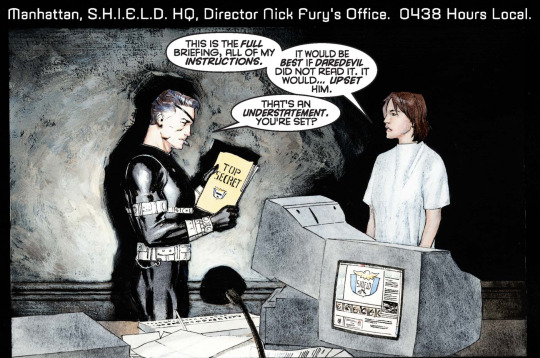
[ID: Natasha Romanov is talking with Nick Fury in his office at SHIELD HQ. Fury is holding a file marked “Top Secret”. Natasha is wearing a hospital gown.]
Natasha: “This is the full briefing, all of my instructions. It would be best if Daredevil did not read it. It would... upset him.”
Fury: “That’s an understatement. You’re set?”
This sets up a distinction between Natasha and Daredevil that will carry through the rest of the story, and which ties into one of the main reasons for his presence in the narrative. Natasha is perfectly willing to do this deed, but she knows Matt would find it upsetting. There is a duality present here– an inherent difference in the behavior Natasha and Daredevil consider to be acceptable. Right away, we are introduced to two different types of morality: the spy versus the superhero.
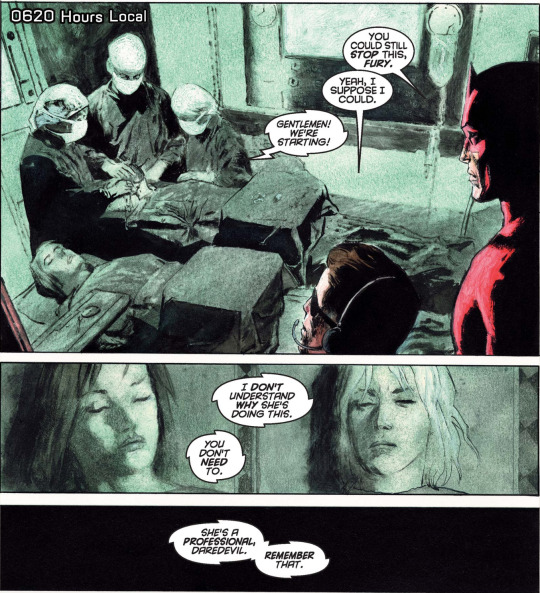
[ID: Daredevil and Nick Fury are standing in an observation room, which overlooks a team of doctors operating on Natasha and Yelena Belova.]
Matt: “You could still stop this, Fury.”
Fury: “Yeah, I suppose I could.”
Matt: “I don’t understand why she’s doing this.”
Fury: “You don’t need to. She’s a professional, Daredevil. Remember that.”
But despite her awareness of this dissonance, Natasha still brings Matt into the operation– for reasons which are not immediately clear, given her initial hesitation. As she predicted, he is disturbed and baffled by it all… though not enough to refuse to take part in her manipulation of her victim. When Yelena wakes up in Natasha’s apartment, wearing Natasha’s face, with no memory of recent events, the first person she encounters is Daredevil.
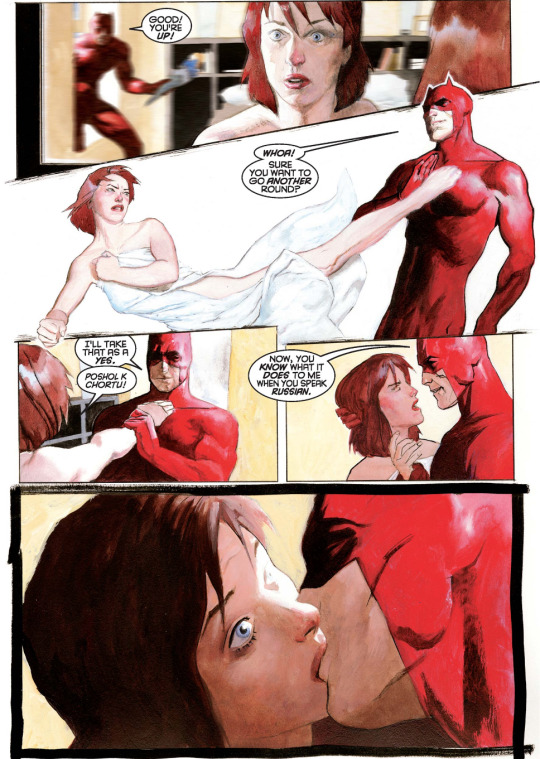
[ID: Yelena Belova is standing in a sunlit apartment. She now looks exactly like Natasha Romanov. She is naked and draped in a bedsheet. Daredevil comes through the window behind her, holding flowers. Yelena, caught off-guard, tries to fight him, but he grabs her and kisses her.]
Matt: “Good! You’re up! Whoa! Sure you want to go another round? I’ll take that as a yes.”
Yelena: “Poshol k chortu!” (“Go to hell!”)
Matt: “Now, you know what it does to me when you speak Russian.”
I live in fear of this scene being taken out-of-context, because while the circumstances doesn’t justify Matt’s behavior, they at least explain it. Here he is operating on Natasha’s orders, flinging Yelena headlong into a stranger’s life by forcing her to deal with an amorous boyfriend. I’ve mentioned the distinctions in Natasha and Matt’s morality as highlighted in this story, but it’s important to remember that they were also partners-- both professionally and romantically-- for years. Their bond is the type formed by two people who used to save each other’s lives on a daily basis. While Matt doesn’t always agree with Natasha’s methods, he still trusts her, and her insistence that using this tactic to rattle Yelena is necessary for the success of the mission has seemingly overridden his discomfort, allowing him to feel justified in committing this violation. It’s also important to know that Matt was also a key player in the story before this one-- Yelena’s introductory arc-- and in that story she was a full-on antagonist who nearly killed both Natasha and Matt. Thus, at this point he still sees her as a threat that needs to be subdued, rather than a misguided young woman deserving of sympathy. Stay tuned-- this will change.
It’s significant that Matt is in costume in this scene, which is odd for someone visiting their girlfriend after (as he implies) spending the night with her. In fact, he is in costume throughout the whole story, and is only ever referred to as Daredevil. This can be compared to the previous arc, in which he appears both in and out of costume. The significance is clear: Daredevil the superhero has a role in this narrative, Matt Murdock the civilian does not.
(Sidenote: I like how Hampton draws the horns. They look more like ears-- like Batman’s cowl-- but they’re very endearing.)
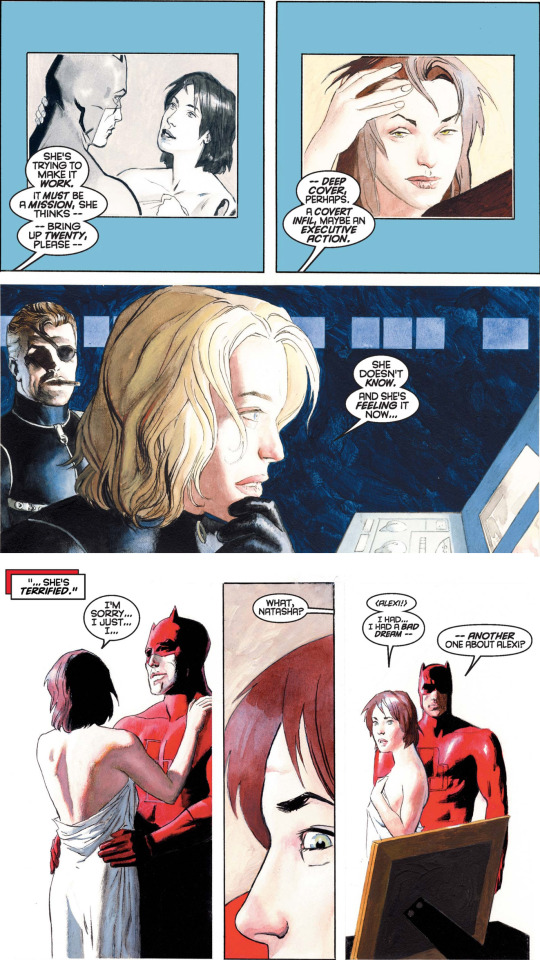
[ID: Natasha (who now looks like Yelena, with shoulder-length blonde hair) and Fury stare at a computer screen, watching via hidden cameras as Yelena recovers her composure and becomes friendlier toward Daredevil.]
Natasha: “She’s trying to make it work. It must be a mission, she thinks-- bring up twenty, please-- deep cover, perhaps. A covert infil, maybe an executive action. She doesn’t know. And she's feeling it now... she’s terrified.”
This is the most important Daredevil moment in the whole story. It defines his role in the narrative and alters his mindset, and Natasha’s commentary emphasizes why: Yelena is terrified.
Matt’s perspective is never emphasized or explained. This is definitively a Black Widow story, with Daredevil just along for the ride, so this is a detail that readers unfamiliar with DD might not notice. But to me, as a Daredevil fan, it grabbed me immediately. Yelena is terrified, and Matt Murdock experiences the terror of others in ways most people couldn’t even imagine. He would be viscerally aware of every change in her physiology, her voice, her behavior that indicated fear. That reaction would be overwhelming to him, impossible to ignore-- as would the awareness that he was a direct cause of that terror. Witnessing this reaction from Yelena would shift his perception of her from enemy to victim, and for someone who cares about people the way Matt does (and all superheroes do), that would have a profound effect on his willingness to continue taking part in her torture.
This shift becomes clear in the very next scene in which he appears-- after Natasha has confronted Yelena, and Yelena has shot her and gone on the run.

[ID: Natasha (who still looks like Yelena), Daredevil, and Fury are riding in an ambulance. Natasha is removing a bullet-proof vest, unharmed after having been shot by Yelena.]
Matt: “Bravo. You’ve turned her into a murderer. Well done. [...] Why are you doing this to her?”
Natasha: “She thinks she’s Natasha Romanov. She thinks she killed Yelena Belova. But she is Yelena Belova. She’s coming undone.”
Matt: “But why, dammit?”
Natasha: “Because I want it that way. If you’re worried for her, go and keep watch. But don’t interfere.”
Matt: “I won’t let her die.”
Natasha: “I know.”
(I love Matt’s distress about Yelena being “turned into a murderer” when he knows for a fact that she kills people on a regular basis...)
Matt is now resisting Natasha’s carefully-laid plans and speaking out on Yelena’s behalf. After this scene he separates from Natasha and spends the rest of the issue following Yelena as she flees through Manhattan. Having initially agreed to take part in attacking her, he has now switched over to protecting her. His sympathy for her reflects the reader’s established sympathy, and positions Yelena and Matt as symbolic allies in opposition to Natasha and Fury.
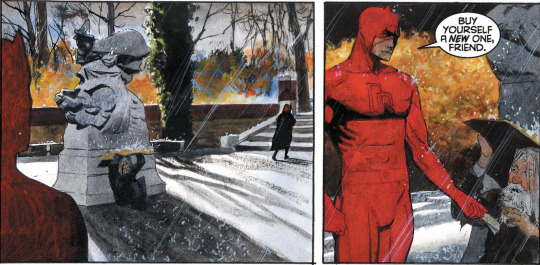
[ID: Daredevil hands money to a homeless man whose raincoat Yelena has stolen.]
Matt: “Buy yourself a new one, friend.”
In a story as short as this, each scene has significance. This tiny moment of everyday selflessness from Daredevil is a little like Superman rescuing a kitten from a tree. It is uncomplicated, archetypal heroism. Again we have that dichotomy of the spy versus the superhero, here shown in opposition to Yelena’s behavior during her fight for survival.

[ID: Fury shouts threats at Yelena as she runs into the night. Daredevil jumps down into view and stands next to Fury. Both are seen only as silhouettes.]
Matt: “This is sadism, Fury.”
Fury: “No. It’s called espionage.”
Nick Fury is the story’s other secondary, non-villainous character. Like Daredevil, his perspective takes a backseat to that of the two Black Widows, and he doesn’t actually do much. His role is to bolster Natasha’s plotline, literally backing her up with his support and SHIELD’s resources, and also validating her behavior and perspective. He provides commentary on the situation for the reader’s benefit, and helps to point out the themes of the story. If Daredevil is the outside observer who is shocked by the proceedings, Fury is the outside observer who understands the messy context of the situation.
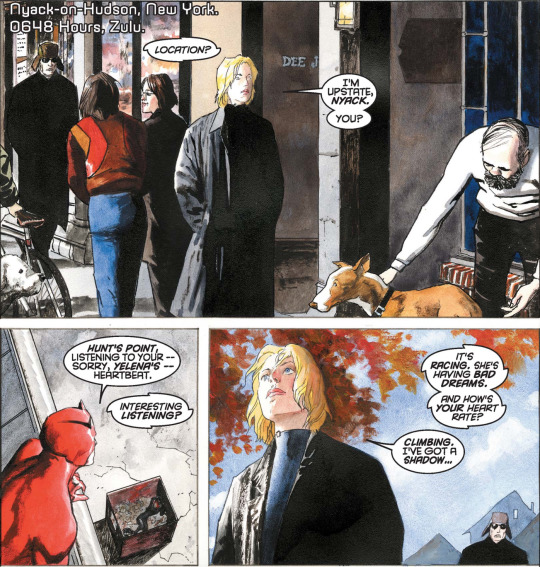
[ID: Natasha is walking down a sunny street in a town in upstate New York. Daredevil is on a rooftop above a dumpster in the Bronx, inside which Yelena is asleep. They are talking to each other via unseen communication devices.]
Matt: “Location?”
Natasha: “I’m upstate, Nyack. You?”
Matt: “Hunt’s Point, listening to your-- sorry, Yelena’s-- heartbeat.”
Natasha: “Interesting listening?”
Matt: “It’s racing. She’s having bad dreams. And how’s your heart rate?”
Here, for the first (and only) time, we are given concrete insight into Matt’s sensory experience of the switch itself. Logic would suggest that the surgery SHIELD performed on Natasha and Yelena was superficial, only changing their appearances. This would put Matt in the symbolically significant position of being the only person who is unaffected by it, who still recognizes Natasha and Yelena as themselves. But here, he seems to suggest that Yelena’s heartbeat now sounds like Natasha’s. That is such an extreme (and medically improbable?) alteration that I’m tempted to just call it a sensory snafu and move on-- particularly since the alternative nicely aligns with the story’s themes. However, if it is true, Matt equating Yelena and Natasha on such an intimate level would further explain why he becomes so protective of Yelena over the course of the story.
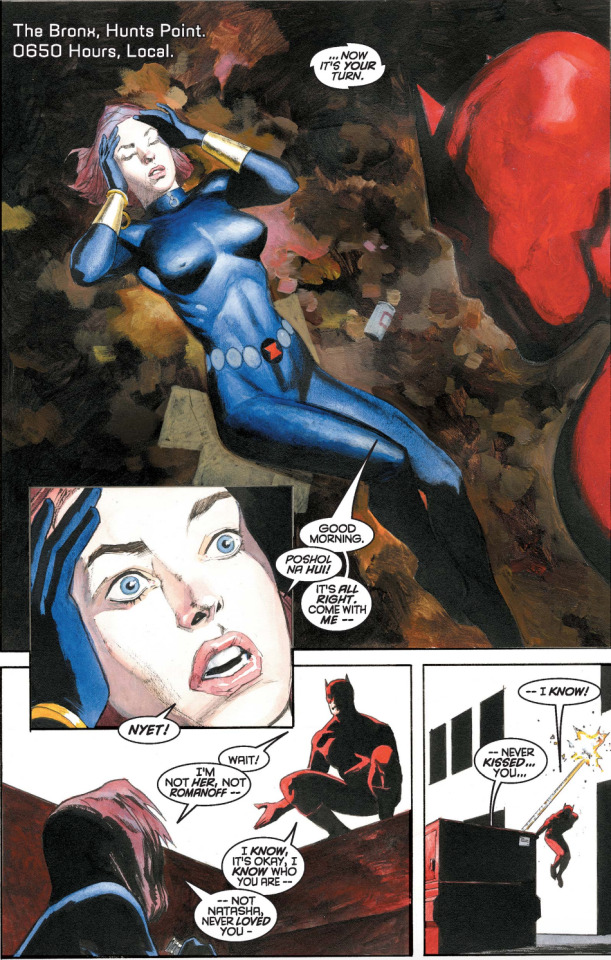

[ID: Daredevil perches on the edge of a dumpster. Yelena is sleeping inside. She wakes up and attacks him, but he calms her down. Drained, she closes her eyes and rests her head on his shoulder. He puts his hand on her back.]
Natasha (off-panel, to Matt): “...Now it’s your turn.”
Matt (to Yelena): “Good morning.”
Yelena: “Poshol na hui!” (“F*** you!”)
Matt: “It’s all right. Come with me--”
Yelena: “Nyet! [...] I’m not her, not Romanoff--”
Matt: “I know, it’s okay, I know who you are--”
Yelena: “--Not Natasha, never loved you--”
Matt: “--I know!”
Yelena: “--Never kissed... you... You... know? [...] Then who... who am I?”
Matt: “Yelena Belova.”
Yelena: “Yelena... I’m... Yelena Belova... the Black Widow...”
Having shadowed her from a distance, Matt finally makes contact the next morning, when Yelena-- exhausted and traumatized from having been chased all night-- curls up in a dumpster to rest. Despite Natasha’s orders to not interfere, he reaches out to Yelena to comfort her. It’s heartbreaking that her violent reaction seems to not be out of fear that he’s going to bring her to SHIELD, but out of fear that he thinks she’s Natasha and is going to force himself on her again. Once he manages to calm her down, he offers what she needs most, and has needed throughout the story: emotional support and affirmation of her identity. Having been given these kindnesses, Yelena can finally relax and regain her footing. This interference destroys the illusion that Natasha so carefully created and grants Yelena power. Matt even brings her upstate, where she confronts both her crooked handlers and, finally, Natasha herself.
And this brings us back to the question of why Daredevil is in this story. What purpose does he serve? Why would Natasha involve him in this scheme at all? She knows Matt better than almost anyone, after all, so it seems like she would have predicted that he’d react this way and mess up her plans.
The only likely explanation is that she did, in fact, predict this-- that Matt’s seemingly insubordinate behavior was part of her plan all along. Natasha didn’t need Matt to mess with Yelena; she was already doing that perfectly well on her own. It makes far more sense to assume that she ordered him into that initial contact in her apartment to spark the moment of sympathy discussed earlier. Beyond her command in the ambulance to not interfere, Natasha seems largely unconcerned about Matt threatening to go rogue, and her "Now it’s your turn” right before Matt visits Yelena in the dumpster suggests that that second interaction may have even happened due to her direct (off-panel) prompting.
"Breakdown” is not about Natasha trying to destroy Yelena; though her methods are cruel, she is trying to save her. She says as much when Yelena confronts her at the end of the story. Natasha wants to show Yelena the harsh reality of life as a spy so that Yelena has a hope of surviving it, but she doesn’t want her to suffer permanent damage-- either physical or psychological. She also can’t directly protect Yelena herself, both because that would negate the whole operation and because she is busy carrying out the other part of the mission-- acting as Yelena to sabotage a weapons grab orchestrated by foreign agents (She wouldn’t be the Black Widow if she wasn’t playing multiple angles at once). Thus, she sends someone else to watch over Yelena during her ordeal-- someone who would be unable to resist helping a suffering victim, but who would have to think it was his own idea. A Hero(TM) with a hero’s morality, which-- as we’ve already established-- is, by necessity, different than a spy’s. This distinction is part of Natasha’s lesson for Yelena.
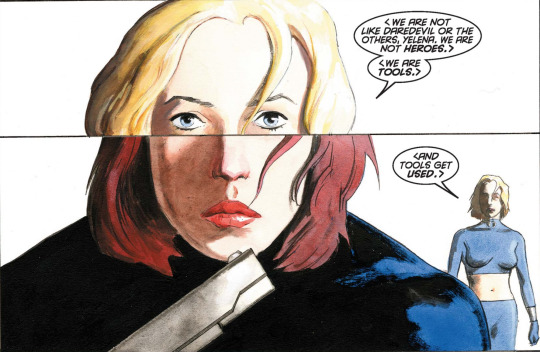
[ID: Two horizontal panels. The first shows the top of Natasha (who still resembles Yelena)’s face. The bottom panel lines this up with the bottom of Yelena (Natasha)’s face. Yelena is holding a handgun, and Natasha is in the background, facing her.]
Natasha: “We are not like Daredevil or the others, Yelena. We are not heroes. We are tools. And tools get used.”
If protecting Yelena is the in-universe reason for Daredevil’s presence, his role as a superhero is the thematic reason. In a story that is exploring the differences in morality between a superhero-- how Yelena initially imagines herself-- and a spy, you need to have a genuine superhero around to provide an example of this distinction. Matt’s behavior in this story is straightforward and protective: he encounters people in need, and he helps them. Of course, we know he does this as Matt Murdock too, but Daredevil-- that technicolor, spandex-ed concept of a superhero and all that that image embodies-- is the identity that matters to this story’s themes. We see Natasha’s relentless pragmatism and Daredevil’s self-sacrificing compassion, and we see Yelena caught in the middle, trying to figure out who she wants to be.

[ID: Daredevil and Nick Fury are standing in an observation room, which overlooks Natasha and Yelena’s appearances being surgically switched back.]
Fury: “Thing of it is, Daredevil, Blondie down there sees things like you do... she thinks she’s a super hero... but Natasha, she’s the Black Widow. She’s the real deal. She knows better. She knows espionage is nasty business.”
If that message wasn’t clear enough, Fury spells it out to the reader (and Matt) in one of the final scenes, after the switch has been undone and Yelena has been prepped to return to her own life. It’s a neat breakdown (...sorry) of Natasha’s character through the lens of both Yelena and Daredevil, and I really love Matt’s presence in this story, even if the reasons for it require some digging.
#Black Widow: Breakdown#Daredevil#Matt Murdock#Black Widow#Natasha Romanov#Yelena Belova#Nick Fury#Commentary
30 notes
·
View notes
Note
I don't understand the hate for Sly 4. Can you explain why you think the game sucked?
Alright. I’ll give you a summary of the major issues I have with Sly 4, and try to keep it brief. Here’s an itemized list of 30 years of disagreements (Sweet Jesus):
-First off, the first half of the game is fucking incredible. (If that sounds like a weird place to start, that’s only because it is.) The opening recaptures the spirit of the games wonderfully - and given I was a returning fan, fresh off an eight-year hiatus, that was amazing - Japan is beautiful and builds well, and Cotton Mouth Bluff is probably my favourite level in the entire damn franchise.Even leaving aside how I can’t pretend bad installments of my favourite things didn’t happen - that’s just not how my brain works - part of the reason Sly 4 irks me is because it had so much goddamn potential. It’s an updated Sly Cooper game where he and the Gang go on time-adventures. We were so close to something incredible. This should, by rights, be my favourite game in the series, and also of all time.I’m angry because I care.
-Carmelita’s redesign. She was already a very sexualized character, but she used to have sensible jeans and a sense of vaguely realistic athleticism. Sanzaru insisted on pushing the sexualization further, and since we started at a pretty advanced point, it got taken to frankly disgusting levels. Her waist terrifies me. You can see her ribs. The badass Interpol inspector is now worryingly underweight. It legitimately creeps me out.
-I don’t like the caveman level. This is the least analytical gripe, I admit that. I just… don’t like the caveman aesthetic. Never liked the Flintstones or anything similar. That’s just subjective.What’s not subjective is how the Gang ending up in just the right place and time to stumble across another of Le Paradox’s lieutenants is a strong contender for the least likely coincidence in all of fiction. But whatevs. Them improvising an escape while falling down a cliff was cool.
-Likewise, as Cooper ancestors go, Bob is very underwhelming. He’s a big ugly block who reuses the Guru’s joke. Instead of Henriette or Slaigh or anybody else in the Vault or Henriette, we got this guy. Great.
-The Grizz. Unfunny character with an awful boss fight. Complete bungling of what a graffiti is or does or sounds like. Unnervingly racist.
-The Penelope twist. Good god in heaven, what even was that? I mean, I was interested. I gave the game the benefit of the doubt, all ears for what the explanation was. Unfortunately, that explanation never came. We’re still not sure what the hell was going through Penelope’s head. She’s just evil now. A lovable character, funny and endearing and not overly sexualized (which in this series is rare), just… twisted. For no real reason.There’s zero textual information justifying her decisions. Especially because the focus is entirely on Bentley, giving her no room to explain herself. And sure! Bentley’s great, I love him, but I also love Penelope and I also love(d) their in-practice painfully brief relationship. I want Geeks in Love doing Crimes Together, not a half-assed betrayal twist.
-Ms Decibel. Irritating to watch. Retread of both Octavio and the Contessa. Has no reason for having mind control powers. The fact it’s just “ha ha there is a trumpet in her nose” genuinely irritates me. This isn’t hard sci-fi, but it ain’t Looney Tunes either. Try harder.The Joke Is That She Is Fat And Ugly. Ha Ha Ha.
-The Carmelita belly dance. Sweet CHRIST. If I keep coming back to this, it’s because it’s gotten me progressively angrier ever since the first time I played it and felt an uncomfortable churn in my gut.This shit is genuinely disturbing. She is coerced. Why did Sanzaru think this was a good idea? Everybody in the writer’s room signed off on this; anyone who may have wanted to stop it didn’t manage to. Then it got animated and designed and Grey DeLisle was called into the booth to voice how beloved strong-willed icon of my childhood Inspector Carmelita Fox was deeply uncomfortable with this sexual act three men she was close to were forcing her to perform. I don’t find this shit amusing. Kids play these fucking games, man.
-Carmelita’s (lack of) use in general. She gets some good moments when she’s first dragged along, again making Tennessee’s level the best. Then she storms off during Bob’s. Then, after wandering back and calming down? Next to nothing. She’s barely there.Bentley shutting down over Penelope’s betrayal was a perfect opportunity for her to take charge and show off her tactical prowess as an officer. What did we get? “Uh… let’s go with Galleth’s plan, then walk forward through Penelope’s front gate. idk guys” Outside of objectifying her, Sanzaru had no idea what to do with her, and it shows.
-The underwhelming climax. The finale of Sly 2 felt earned. The original three all had great final acts, but I bring up the second because it resembles the fourth. In both, there’s a last-minute upset where everything the Gang has accomplished so far is suddenly snatched away.But Sly 2 built that feeling. From the moment Jean Bison sees through the Gang’s disguises, things get worse and worse. The time they spend in stony silence, hiding in that battery, really creates a sense of encroaching dread. Things are going wrong, but they’re going wrong slowly. And that’s worse.Sly 4 - perhaps due to a dwindling budget - rockets through where that suspense should be. “Le Paradox showed up and stole Carmelita and then his plan worked and he was king of everything and we were sad but we went to fight him anyway.” wow. my emotions. i’m so invested.One of the lines I can particularly remember is “I don’t ever remember feeling so defeated.” Oh, you don’t, Sly? Not when you lost every Clockwerk Part at once? Not when Clockwerk was reassembled and Neyla merged with him? Not when you watched your parents be murdered in front of you?It’s 100% Tell, 0% Show. That’s not how you do a finale.
-Le Paradox. God. Just… god. Obnoxious in a way that isn’t entertaining. An awful, nasty character who does not receive an adequate level of comeuppance for his overblown, overwrought crimes. Rapey. He hates Sly for something Conner did; Sly has no agency here, he’s just a victim, pulled into the story because he’s directly threatened over something he had no part in. That’s bad writing. Bad writing which retreads other, more interesting antagonists.Doesn’t hold a candle to Clockwerk, Arpeggio, Neyla or Dr M. Unlike them, Le Paradox survives his game, which a) feels like too light a punishment if everybody else got a dramatic death and b) creates the worrying prospect they intend to bring him back. Ugh. Would work fine as an insignificant filler villain; instead, has means, power level, and (intended) gravitas outstripping Clockwerk. Total disconnect between his persona and his stupid, childishly powerful plan.Bigger =/= better.Skunks don’t come from France.
And, of course, the grand finale. The last thing to happen to Sly Prime. To this day, four and a half years later, the current state of the original series, and what may well be the overall ending at this point no matter what Sanzaru originally intended long-term. Everybody sing along at home~!
-A terrible cliffhanger ending with no sequel greenlit!
There. That about covers it. For me, anyway. Everybody has their own take.For the record, every box in that brain meme is a genuine opinion of mine. Sly 4 is most certainly a Sly game. It has amazing art and great moments. It brought in a ton of new fans, and kept the franchise going. That can’t be undervalued.But it’s the most flawed installment by a wide, wide margin. Sly 1 was rough, but a lot of that feels like beginner’s jitters. 4′s flaws feel more like huge, enthusiastic strides in the wrong goddamn direction, made by well-meaning people who are super excited to bring the franchise to places I do not want it to go. Like Sexual Objectification Town.
I don’t hate it blindly, but I can’t pretend I love it. I’m not gonna repress my negativity. This is my blog where I talk about Sly Cooper. And when I talk about Sly 4, I won’t skip over its flaws. In the vague hope that maybe, if I explain how and why these things don’t work, there’ll be less of these mistakes in the world. For my own writing, if nothing else. Straightening out my emotions into coherent, rational analysis. Looking toward the future.
…that and because it’s cathartic.
#iamkel14#sly 4#long post#Skunks don't come from France#I will not equivocate on my opinion#I have always worn it on my sleeve#rant
73 notes
·
View notes
Text
[Eugene Volokh] Discipline of UNM Med Student for "Unduly Inflammatory" Anti-Abortion Post Upheld
There is no "clearly established" First Amendment rights of public university professional school students to engage in such speech, a federal court holds.
Shortly after the 2012 election, Paul Hunt, then a medical student at the University of New Mexico, posted this on his personal Facebook page:
All right, I've had it. To all of you who support the Democratic candidates: The Republican Party sucks. But guess what. Your party and your candidates parade their depraved belief in legal child murder around with pride.
Disgusting, immoral, and horrific. Don't celebrate Obama's victory tonight, you sick, disgusting people. You're abhorrent.
Shame on you for supporting the genocide against the unborn. If you think gay marriage or the economy or taxes or whatever else is more important than this, you're fucking ridiculous.
You're WORSE than the Germans during WW2. Many of them acted from honest patriotism. Many of them turned a blind eye to the genocide against the Jews. Bur you're celebrating it. Supporting it. Proudly proclaiming it. You are a disgrace to the name of human.
So, sincerely, fuck you, Moloch worshipping assholes.
I doubt that this is an effective way of persuading anyone, but I would have thought that it was clearly constitutionally protected, and that a public university had no power to punish such speech. But the University of New Mexico School of Medicine thought otherwise, and disciplined Hunt for violating its "Respectful Campus Policy," which appears to apply to social media posts, and which at the time said (the current version is vaguer):
Individuals at all levels are allowed to discuss issues of concern in an open and honest manner, without fear of reprisal or retaliation from individuals above or below them in the university's hierarchy. At the same time, the right to address issues of concern does not grant individuals license to make untrue allegations, unduly inflammatory statements or unduly personal attacks, or to harass others, to violate confidentiality requirements, or engage in other conduct that violates the law or University policy.
The medical school claimed that this statement was "unduly inflammatory," involved an "unduly personal attack[]," and "harass[ed] others"; its view then is that even sharp criticisms of a large group ("all of you who support the Democratic candidates") are punishable as being "unduly personal."
Hunt was ordered to go through a "professional enhancement prescription," which required "mentorship by a faculty member who would 'assign readings and supervise a reflective writing assignment on patient autonomy and tolerance," producing a "reflective writing assignment on the public expression of political beliefs by physicians," writing "an apology letter, which Hunt could present to anyone of his choice, or no one at all," going through "ongoing meetings with [a faculty member] over a one-year period," and "rewriting the Facebook post in a passionate, yet professionally appropriate way." Here was Hunt's rewrite:
To the supporters of Democratic candidates;
I have many disagreements with the Republican Party, and to be honest, I find some of their positions as ill-conceived and detrimental as the most ardent Democrat. However, I find myself disturbed in the defense of the pmty and the rejoicing in its victory tonight. This is, of course, because as one of its core positions, the Democratic Party supports the legality of the murder of children. This belief, by some, is worn with shame. However, too often, supporters of the Democrats parade their support of this particular issue as a high virtue. It ls lauded with great pride.
This act of abortion, feticide, murder, pregnancy termination -- whatever you wish to call it -- is disgusting and immoral. Hunan beings at their most innocent and vulnerable are being killed. Many of you are celebrating President Obarna's re-election with great joy because of his support for the continued legality of abortion, and frankly, this exuberant jubilation disgusts me. I have many friends who think that legal means have been exhausted, and that there is essentially no difference between Republicans and Democrats on this issue. Republicans use it to get votes, and the legality of abortion is firmly entrenched. I disagree, but I sympathize with this position and understand why someone would vote Democratic accordingly. However, every other issue, healthcare reform, marriage equality, the economy, or taxes, pales in comparison to the murder of 1.3 million human beings every year.
To those who support the Democratic Party specifically because of its position on abortion, I say to you, "Shamel" Many have stood by in history duting genocide and other mass murders with tacit approval. Some have stood by in fear to speak up for their own lives and safety. Others participate and goad on. I urge those of you engaged in promoting and continuing this atrocity to reconsider your positions.
Still not good enough, said the Committee for Student Performance and Evaluation (according to Hunt's account in his affidavit, which the university did not deny). Hunt had to rewrite this again, and the Committee then accepted the revised version, which omitted the reference to genocide, atrocity, and shame -- though it's hard to tell what exactly the Committee thought was necessary to have this political statement be sufficiently "professional."
Hunt sued, and yesterday the federal district court rejected his First Amendment claim: University officials, the court said, were entitled to "qualified immunity" because any First Amendment protection against such restrictions on supposedly "inflammatory" speech by public university professional students wasn't "clearly established" enough. Qualified immunity is notoriously hard for plaintiffs to defeat, because such immunity from damages protects "all but the plainly incompetent or those who knowingly violate the law," so usually plaintiffs must point to a binding precedent squarely on point; and while here I think the body of First Amendment law is clear enough that the plaintiff should have prevailed, I can see why a court might conclude otherwise.
Still, this is an excellent illustration of just how broad university censorship of student opinions has gotten -- an illustration we should keep in mind when we consider how such "respect" codes can be applied. Here we have:
student speech on a clearly political topic,
said outside campus,
not as part of any class assignment or educational project,
not closely connected to the author's professional responsibilities, and
not targeted to criticize any particular person.
This isn't, for instance, a trainee doctor being disciplined for speech to a patient, or for refusing to treat a patient; it isn't a trainee being admonished for a poor bedside manner in the conduct of his professional responsibilities. The university is purporting to police, in the name of "professionalism," the person's public political pronouncements. To be sure, even in the absence of some of these factors, the speech should still be protected; but when all these factors are present, it seems to me that the university's error is especially clear.
Nor do I think that the medical school action could be justified by the vulgarities in Hunt's original post. First, note that the medical center rejected Hunt's first rewrite, which didn't include such vulgarities; the strongest terms in it are saying "Shame!," saying that abortion "is disgusting," and calling it "murder," an "atrocity," and akin to "genocide."
Second, the prohibition in the policy wasn't limited to vulgarities, but covered any "unduly inflammatory statements." This was potentially much broader than a ban on vulgarity; it was vague; and it was obviously open to applications that discriminate based on viewpoint (since what is "unduly" inflammatory and what is "duly" so doubtless turns on whether the university agrees that some action is atrocious, shameful, or disgusting).
Third, I don't think public universities have any power, under the First Amendment, to try to police vulgarities in students' speech, at least outside classes and curricular projects (such as internships). This very case helps show why the lesson of Cohen v. California (1971) (the "Fuck the Draft" case) applies fully to such situations:
First, the principle contended for by the State seems inherently boundless. How is one to distinguish this from any other offensive word? Surely the State has no right to cleanse public debate to the point where it is grammatically palatable to the most squeamish among us. Yet no readily ascertainable general principle exists for stopping short of that result were we to affirm the judgment below. For, while the particular four-letter word being litigated here is perhaps more distasteful than most others of its genre, it is nevertheless often true that one man's vulgarity is another's lyric. Indeed, we think it is largely because governmental officials cannot make principled distinctions in this area that the Constitution leaves matters of taste and style so largely to the individual.
Additionally, we cannot overlook the fact, because it is well illustrated by the episode involved here, that much linguistic expression serves a dual communicative function: it conveys not only ideas capable of relatively precise, detached explication, but otherwise inexpressible emotions as well. In fact, words are often chosen as much for their emotive as their cognitive force. We cannot sanction the view that the Constitution, while solicitous of the cognitive content of individual speech, has little or no regard for that emotive function which, practically speaking, may often be the more important element of the overall message sought to be communicated. Indeed, ... "[o]ne of the prerogatives of American citizenship is the right to criticize public men and measures—and that means not only informed and responsible criticism but the freedom to speak foolishly and without moderation."
Finally, and in the same vein, we cannot indulge the facile assumption that one can forbid particular words without also running a substantial risk of suppressing ideas in the process. Indeed, governments might soon seize upon the censorship of particular words as a convenient guise for banning the expression of unpopular views. We have been able, as noted above, to discern little social benefit that might result from running the risk of opening the door to such grave results.
Finally, I find it hard to imagine that the medical school was prepared to equally police "inflammatory" expression of all viewpoints, such as rants against alleged police brutality, or President Trump, or supposedly unethical businesses. The court concluded (pp. 20-21 n.4) that Hunt hadn't introduced enough evidence that the medical school had knowingly declined to enforce the policy against other posts in the past. But I can't imagine that a modern medical school would indeed consistently enforce such a policy in the future; instead, human nature being what it is, the school would likely punish sharp rhetoric expressing some views but not similarly sharp rhetoric expressing other views. Whether or not Hunt's damages claim should have succeeded, the policy itself strikes me as unjustifiable.
0 notes